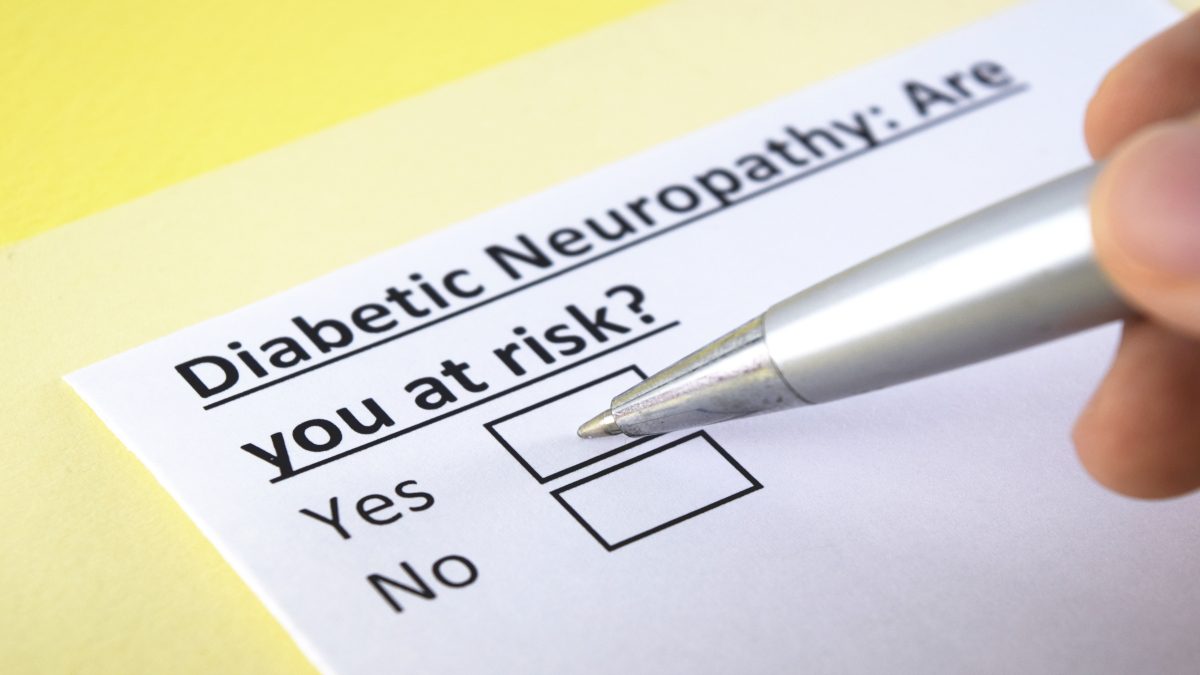Diabetic neuropathy diagnosis
In order to make a diabetic neuropathy diagnosis, the doctor may perform a physical exam and become familiar with your medical history. Your doctor may check your overall muscle strength and tone, sensitivity to vibration and touch, tendon reflexes.
Also, your doctor may order some additional tests to confirm your diabetic neuropathy. Such exams include:
- Filament test. To assess your sensitivity to touch, your doctor will run a soft nylon fiber (monofilament) over specific areas of your skin.
- Testing of nerve conduction. Your doctor may estimate how quickly your arms and legs nerves conduct electrical signals by performing this test.
- Autonomic testing. The doctor may perform some tests to see how your blood pressure changes when you change positions and if you sweat adequately.
- Electromyography (muscle response testing). This test involves measuring electrical discharge in your muscles. Also, this test is typically done along with a nerve conduction test.
- Sensory testing. This non-invasive test helps your doctor to determine how your nerves respond to temperature changes and vibrations.
Diabetic neuropathy treatment
Unfortunately, diabetic neuropathy isn’t treatable. Therefore, the main treatment goals are to slow the disease’s progression, relieve the pain, manage complications, and restore the function.
Slowing diabetic neuropathy progression
The main component of delaying the progression of the disease is blood sugar control and keeping it within the designated range. In addition, good blood sugar management may lead to the improvement of your current symptoms. Depending on factors such as your age, how long you have experienced diabetes, and your overall health condition, your doctor will designate the best target range for you.
For most people experiencing diabetes, the American Diabetes Association recommends the following levels of blood sugar:
- Before meals: between 80 and 130 mg/dL, ( between 4.4 and 7.2 mmol/L).
- Two hours after meals: less than 180 mg/dL (10.0 mmol/L).
Additional ways that may help you slow the progression of diabetic neuropathy involve controlling your blood sugar levels, getting regular physical activity, and keeping a healthy weight.
Relieving the pain
Diabetes-related nerve pain may be treated with many prescription medications, but they don’t work for everyone. Therefore, you may discuss taking medicines with your doctor, and he/she will find an appropriate medication for you based on your health condition, benefits and side effects of the drug.
Pain-relieving prescription remedies include:
- Antidepressants. Several antidepressant drugs may relieve nerve pain without impact on your mental health. Therefore, you can take them even if you aren’t depressed. Tricyclic antidepressants (amitriptyline, imipramine, and desipramine) may ease mild to moderate nerve pain. Another type of antidepressant used in treating nerves pain is serotonin and norepinephrine reuptake inhibitors (SNRIs). However, these medicines also have few side effects, including dizziness, nausea, decreased appetite, constipation and sleepness.
- Anti-seizure drugs. Some medicines aimed to treat seizure ailments (epilepsy) can also be used to relieve pain caused by diabetic neuropathy. Pregabalin (Lyrica) and gabapentin (Grasile, Neurontin) are examples of such drugs. Tough, there are a few side effects, such as drowsiness, swelling and dizziness.
Antidepressants are sometimes combined with anti-seizure drugs.
Management of complications and restoring function
The treatment methods that you will need depend on the neuropathy-related complications you experience:
- Digestive problems. Medications and diet changing may reduce diarrhea, constipation, nausea and gastroparesis. Also, by eating smaller and more frequent meals, you may relieve mild symptoms of gastroparesis, such as nausea, vomiting, or indigestion.
- Sexual dysfunction. Oral or injectable medications may improve male sexual dysfunction problems. However, such drugs aren’t safe and effective for everyone. Also, vacuum devices that increase blood flow to the penis may help you. Vaginal lubricants may provide relief for women.
- Urinary problems. Several medicines may affect bladder function, so your doctor may recommend you stop taking or change the drugs. Scheduling your urination, voiding every two hours, applying gentle pressure to the bladder region while urinating, and other tips may help you to relieve bladder problems. In more severe cases, self-catheterization and other methods may be needed.
- Orthostatic hypotension. It is a low blood pressure on standing. Some lifestyle changes such as escaping alcohol, drinking an adequate amount of water, changing sitting position for standing position slowly may relieve symptoms. Also, your doctor may recommend an abdominal binder. Several medicines may also help you to deal with orthostatic hypotension.
Lifestyle and home remedies to relieve diabetic neuropathy symptoms
Measures that may help you to relieve symptoms and reduce the risk of diabetic neuropathy development include:
- Quit smoking
- Make healthy food choices
- Be active
- Keep your blood pressure under control
















Leave a Reply
You must be logged in to post a comment.